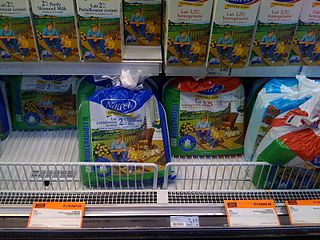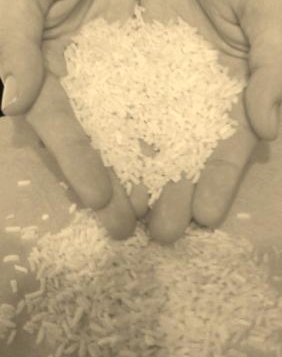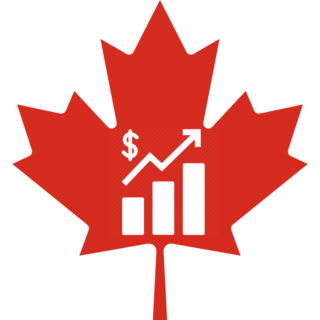
Beak trimming, or beak conditioning, is the partial removal of the beak of poultry, especially layer hens and turkeys, although it is also performed on some quail and ducks. When multiple birds are confined in small spaces, they are more likely to hurt each other through pecking. Beak trimming aims to avoid damage done by pecking, although the practice is criticized by animal welfare organizations and banned in several European countries. Beak trimming is most common in egg-laying strains of chickens. In some countries, such as the United States, turkeys routinely have their beaks trimmed. In the UK, only 10% of turkeys are beak trimmed.
A marketing board is an organization created by many producers to try to market their product and increase consumption and thus prices. It can also be defined as an organization set up by a government to regulate the buying and selling of a certain commodity within a specified area. They most commonly exist to help sell farm products such as milk, eggs, beef or tripe and are funded by the farmers or processors of those crops or products. Marketing boards often also receive funding from governments as an agricultural subsidy. The leadership and strategies of the marketing boards are set through votes by the farmers who are members of the board.
Agriculture and Agri-Food Canada is the department of the Government of Canada responsible for the federal regulation of agriculture, including policies governing the production, processing, and marketing of all farm, food, and agri-based products. Agriculture in Canada is a shared jurisdiction and the department works with the provinces and territories in the development and delivery of policies and programs.

The Canadian Dairy Commission (CDC) is an Ottawa-based Government of Canada Crown Corporation that provides a framework for managing Canada's dairy industry.

The Ministry of Agriculture, Food and Rural Affairs (OMAFRA) is an Ontario government ministry responsible for the food, agriculture and rural sectors of the Canadian province of Ontario. The Minister is currently Lisa Thompson.

A price floor is a government- or group-imposed price control or limit on how low a price can be charged for a product, good, commodity, or service. It is one type of price support; other types include supply regulation and guarantee government purchase price. A price floor must be higher than the equilibrium price in order to be effective. The equilibrium price, commonly called the "market price", is the price where economic forces such as supply and demand are balanced and in the absence of external influences the (equilibrium) values of economic variables will not change, often described as the point at which quantity demanded and quantity supplied are equal. Governments use price floors to keep certain prices from going too low.
In the United States, a commodity checkoff program promotes and provides research and information for a particular agricultural commodity without reference to specific producers or brands. It collects funds through a checkoff mechanism that is sometimes called checkoff dollars, from producers of a particular agricultural commodity and uses these funds to promote and do research on that particular commodity. As stated earlier the organizations must promote their commodity in a generic way without reference to a particular producer. Checkoff programs attempt to improve the market position of the covered commodity by expanding markets, increasing demand, and developing new uses and markets. Checkoff programs amount to $750 million per year.

Food policy is the area of public policy concerning how food is produced, processed, distributed, purchased, or provided. Food policies are designed to influence the operation of the food and agriculture system balanced with ensuring human health needs. This often includes decision-making around production and processing techniques, marketing, availability, utilization, and consumption of food, in the interest of meeting or furthering social objectives. Food policy can be promulgated on any level, from local to global, and by a government agency, business, or organization. Food policymakers engage in activities such as regulation of food-related industries, establishing eligibility standards for food assistance programs for the poor, ensuring safety of the food supply, food labeling, and even the qualifications of a product to be considered organic.

Reference Re Agricultural Products Marketing, [1978] 2 S.C.R. 1198 is a landmark constitutional decision of the Supreme Court of Canada on cooperative federalism where the Court unanimously upheld the validity of various Acts passed by the Parliament of Canada and the Legislative Assembly of Ontario for establishing a national agricultural marketing scheme agreed upon by the federal and provincial governments.

Canada is one of the largest agricultural producers and exporters in the world. As with other developed nations, the proportion of the population agriculture employed and agricultural GDP as a percentage of the national GDP fell dramatically over the 20th century, but it remains an important element of the Canadian economy. A wide range of agriculture is practised in Canada from Newfoundland on the Atlantic to British Columbia on the Pacific. In the federal government, overview of Canadian agriculture is the responsibility of the Department of Agriculture and Agri-Food.

The Packers and Stockyards Act of 1921 regulates meatpacking, livestock dealers, market agencies, live poultry dealers, and swine contractors to prohibit unfair or deceptive practices, giving undue preferences, apportioning supply, manipulating prices, or creating a monopoly. It was enacted following the release in 1919 of the Report of the Federal Trade Commission on the meatpacking industry.

Industrial agriculture is a form of modern farming that refers to the industrialized production of crops and animals and animal products like eggs or milk. The methods of industrial agriculture include innovation in agricultural machinery and farming methods, genetic technology, techniques for achieving economies of scale in production, the creation of new markets for consumption, the application of patent protection to genetic information, and global trade. These methods are widespread in developed nations and increasingly prevalent worldwide. Most of the meat, dairy, eggs, fruits and vegetables available in supermarkets are produced in this way.
Intensive animal farming, industrial livestock production, and macro-farms, also known as factory farming, is a type of intensive agriculture, specifically an approach to animal husbandry designed to maximize production while minimizing costs. To achieve this, agribusinesses keep livestock such as cattle, poultry, and fish at high stocking densities, at large scale, and using modern machinery, biotechnology, and global trade. The main products of this industry are meat, milk and eggs for human consumption.

The California Department of Food and Agriculture (CDFA) is a cabinet-level agency in the government of California. Established in 1919 by the California State Legislature and signed into law by Governor William Stephens, the Department of Food and Agriculture is responsible for ensuring the state's food safety, the protection of the state's agriculture from invasive species, and promoting the California agricultural industry.

Dairy Farmers of Canada (DFC) is the national policy, lobbying, and promotional organization representing Canadian dairy producers. The advocacy group was created in 1934 when a number of related groups merged to form a single entity for representing the interests of dairy farmers.

Poultry farming is a part of the United States's agricultural economy.

Dairy farming is one of the largest agricultural sectors in Canada. Dairy has a significant presence in all of the provinces and is one of the top two agricultural commodities in seven out of ten provinces.
Dairy Farmers of Ontario (DFO), is the marketing organization and regulatory body representing over 4,000 dairy farmers in Ontario, Canada. DFO was formerly known as the Ontario Milk Marketing Board (OMMB), which was established as result of the 1965 Ontario Milk Act. On August 1, 1995, the Ontario Milk Marketing Board and the Ontario Cream Producers' Marketing Board merged to form Dairy Farmers of Ontario.

Canada's supply management, abbreviated SM, is a national agricultural policy framework used across the country, which controls the supply of dairy, poultry and eggs through production and import controls and pricing mechanisms. The supply management system was authorized by the 1972 Farm Products Agencies Act, which established the two national agencies that oversee the system. The Agriculture and Agri-Food Canada federal department is responsible for both the Canadian Dairy Commission and its analogue for eggs, chicken and turkey products, the Farm Products Council of Canada. Five national supply management organizations, the SM-5 Organizations — Egg Farmers of Canada (EFC), Turkey Farmers of Canada (TFC), Chicken Farmers of Canada (CFC), the Canadian Hatching Egg Producers (CHEP) and the Ottawa-based Canadian Dairy Commission (CDC), a Crown corporation — in collaboration with provincial and national governing agencies, organizations and committees, administer the supply management system.

The broiler industry is the process by which broiler chickens are reared and prepared for meat consumption. Worldwide, in 2005 production was 71,851,000 tonnes. From 1985 to 2005, the broiler industry grew by 158%.













